

Volume 3, Number 39
|
"There's a Jewish story everywhere"
|
Today's Postings:
|
|||||||
![]()
SAN DIEGO JEWISH ACADEMY CONGREGATION BETH ISRAEL
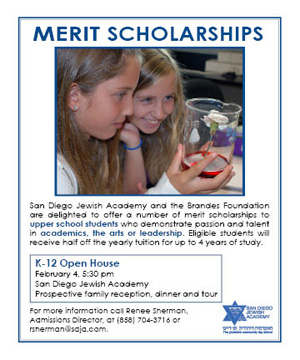 .
.
To visit the websites of San Diego Jewish Academy or Congregation Beth Israel, please click on the respective advertisement
Return to top
![]()
THE VIEW FROM JINSA
U.S. 'resetting' relations with Russia, Syria
 WASHINGTON, D.C.—The Obama Administration wants to "push the reset button," to quote Vice President Joe Biden, hoping to invigorate relationships with countries that have been in our proverbial doghouse. In the case of Russia and Iran, both Mr. Biden and President Obama took pains to announce continuing disapproval of various policies of dictatorial regimes, but a willingness to look for separate areas of possible cooperation. Syria received private and congressional emissaries, plus parts for repairing two aging Boeing 747s.
WASHINGTON, D.C.—The Obama Administration wants to "push the reset button," to quote Vice President Joe Biden, hoping to invigorate relationships with countries that have been in our proverbial doghouse. In the case of Russia and Iran, both Mr. Biden and President Obama took pains to announce continuing disapproval of various policies of dictatorial regimes, but a willingness to look for separate areas of possible cooperation. Syria received private and congressional emissaries, plus parts for repairing two aging Boeing 747s.
Reset with Russia is probably a good thing at some level; Russia is not the Soviet Union and not an enemy of the United States. Russia's increasingly authoritarian and threatening behavior at home and abroad, however, begs the question, "Who will reset what?" The invasion of Georgia, cutting natural gas supplies to Europe at the height of a very cold winter and a sudden, massive "denial of service" that shut down more than 80 percent of Kyrgyzstan's Internet bandwidth are aggressive acts against countries that look to the United States for political reassurance and leadership. [The Kyrgyzstan Internet attack was almost totally unremarked upon in the West, but resembled Russia's attack on Georgia's capabilities during last summer's war. The proximate result was that the Kyrgyz government announced the United States could no longer use local facilities to ship vital supplies to coalition forces in Afghanistan.]
One of Russia's goals is to have the Obama Administration reverse the decision to locate Ballistic Missile Defense radars in Poland and the Czech Republic. Putin knows there is no threat to Russia, but he does not want American soldiers to accompany the radars into former Warsaw Pact countries. Mr. Biden did say plans for installation continue, but also said the administration would only deploy ballistic missile defenses that are proven and cost effective. Since one hopes they will never be used, proving that they work to the satisfaction of people who don't believe in the principle, and proving they would be more cost effective than rebuilding countries after a missile attack are both unrealistic.
So the outline of a deal is clear - the United States gives up the radars and Russia, well Russia does what?
Selling parts for old planes to Syria certainly poses no security threat to Israel or Lebanon, but it sends a disconcerting message to two of America's regional allies. The sale required suspending congressionally mandated trade sanctions imposed in 2004 along with the naming of Syria as a state sponsor of terror. Syria is no less a state sponsor of terrorism today - hosting Hamas's Khalid Meshaal and giving him open access in the Syrian media to call for terrorism against Israel. Syria remains obstructionist regarding the UN Tribunal investigating the car bomb murder of anti-Syrian Lebanese politician Rafik Hariri and the Syrians were involved in al Qaeda-related insurgent fighting in Palestinian refugee camps in northern Lebanon.
So the outline of the deal is clear - the United States suspends trade sanctions and Syria, well Syria does what?
President Obama said he "is looking at areas where we can have constructive dialogue, where we can directly engage with [Iran]. And my expectation is, in the coming months, we will be looking for openings that can be created where we can start sitting across the table, face to face; of diplomatic overtures that noted will allow us to move our policy in a new direction." The mullahs might have been disappointed when the President mentioned Iranian "financing of terrorist organizations like Hezbollah and Hamas, the bellicose language that they've used towards Israel, their development of a nuclear weapon or their pursuit of a nuclear weapon...contrary to the interests of international peace."
So the outline of the deal is clear - the United States concentrates on areas where we have no problem with Iranian behavior and Iran, well Iran does what?
The first problem is that the administration appears unclear on what it should/will be able to extract from recalcitrant countries in exchange for American gifts to their problematic governments. The second problem is the bus under which the administration risks throwing smaller and more vulnerable allies.
![]()
UNITED JEWISH FEDERATION OF SAN DIEGO
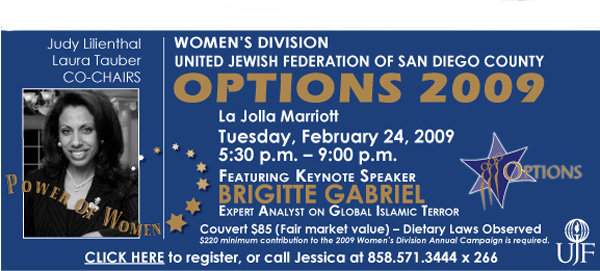
Return to top
![]()
TIFERETH ISRAEL SYNAGOGUE

Return to top
![]()
The Last Train and One of the Last Witnesses
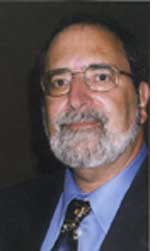 SAN DIEGO—Last week I introduced the German film, The Last Train, at the San Diego Film Festival. The film dramatically depicts the journey of the last transport of Jews from Berlin to Auschwitz in April of 1943. As I walked up the aisle before the screening, a distinguished gentleman walking with a cane tapped me on the shoulder. “Who’s the speaker, tonight,” he inquired. After I identified myself, he informed me, “My name is Gerhart Mashkovsky. I was deported on one of those trains. Might I be permitted to speak to the audience after the movie is over?”
SAN DIEGO—Last week I introduced the German film, The Last Train, at the San Diego Film Festival. The film dramatically depicts the journey of the last transport of Jews from Berlin to Auschwitz in April of 1943. As I walked up the aisle before the screening, a distinguished gentleman walking with a cane tapped me on the shoulder. “Who’s the speaker, tonight,” he inquired. After I identified myself, he informed me, “My name is Gerhart Mashkovsky. I was deported on one of those trains. Might I be permitted to speak to the audience after the movie is over?”
Historians dream of these kinds of moments. One of a dwindling number of Holocaust survivors was present to corroborate or dispute the cinematic reenactment of an ordeal he or she personally experienced. Although we could not stay in the theatre, Sandra Kraus, the producer of the festival, invited members of the audience to come to the patron’s lounge and ask Gerhart questions.
In a quiet but authoritative voice, Gerhart bore witness. At the age of thirteen, he had been sent to a labor camp near Berlin in 1939. His older brother immigrated to Palestine that year, but Gerhard’s parents insisted that he was too young to accompany him. Gerhart appreciated that the film conveyed how cramped it was when 120 people were herded into a cattle car. He verified that getting a drink of water became the major preoccupation of every passenger. He grimaced as he recalled the indignity of relieving himself in an Eimer, a bucket overflowing with excrement and urine. He confirmed that he knew of successful escapes from the trains, but admitted that no one in his car had dared to do so.
As it pulled into Auschwitz, members of the Sonderkommando descended upon the train to unload its weary occupants, their meager belongings, and the bodies of those who died along the way. Gerhart shuddered when he thought of the Kapos who wore green triangles on their striped “pajamas.” They were hardened German criminals who had been promoted to be cruel taskmasters of the Jewish inmates. Soon transferred to toil at the IG Farben Buna Factory in the subcamp of Monowitz, Gerhart attributed his survival partly to the strength he had developed as a worker in his prior internment and to a pair of shoes that he was allowed to keep. The latter proved particularly crucial during the death march back to Germany in the Winter of 1945 when the only source of water was snow. Gerhart weighed 70 pounds when the Red Army liberated him.
Though the doctors expected Gerhard to die, he recuperated in three months and then embarked on a quest to find his parents. He scoured the lists of survivors of various camps compiled by relief agencies, but failed to find their names. He did locate a former neighbor. By coincidence, his parents had written a letter to the neighbor. They had been imprisoned in Theresienstadt and had been transferred to a Displaced Persons Camp in Bavaria at the end of the war. Gerhard joined them and stayed there until 1947 when he was allowed to immigrate to the United States. Since his father had been blinded serving Germany in World War One, he was denied immigrant status and his wife remained with him in Europe.
Those of us who had the opportunity to hear Gerhart realized that we too had been transported that night. We had begun the evening in a dark theatre watching images of horror and resilience flicker on a screen. We ended the night conversing with someone whose recollections were more vivid and disturbing than what we had seen. We had eavesdropped on the voice of history.
JEWISH FAMILY SERVICE

Please click the ad above to learn more about JFS Economic Crisis Response Program
Return to top
![]()
LETTER TO THE EDITORAvraham Freedman, like the Bielskis, led Partisans
Editor, San Diego Jewish World:I read with great interest Bruce Kesler's review of the film, Defiance, which I have not seen yet. I am writing a book on my family's town, Dolhinov, and have been conducting both archival research and interviews. About 450 Jews in the town—the only ones left of 5000 residents and refugees--survived fighting or living with various partisan units, primarily with the one next door to the Bielski's, the 'People Avengers" commanded by Ivan Timchuk whose chief aide was Avraham Freedman of Dolhinov. These stories are just starting to be told, partially because of the availability of new documents and studies from the post-Soviet countries.
In a unique event, about 300, including a number of my relatives, were evacuated by the Red Army on a 500-mile march through German lines,
organized by Timchuk. This is an area of swamps and thick forests, perfect for partisan warfare.
A key factor was whether units had Jews as members. The Bielskis were almost unique in being commanders since in most cases, the leaders were
chosen by the Soviet command from experienced veterans told to stay behind German lines in 1941.
Another feature of this area was that it experienced 18 months of Soviet occupation followed by 3 years (though Jews only lived through the
first ten months in their homes or at all) of German occupation. Those who couldn't get out at the war's end spent the next 12 years trying to get out of the USSR to come to Israel.
Professor Barry Rubin
Director, Global Research in International Affairs Center
Herzliya, Israel
![]()
SOILLE SAN DIEGO HEBREW DAY SCHOOL

Which blessing is said for different foods?
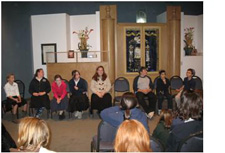 SAN DIEGO (Press Release)—Sunflower seeds? Kishke? Pistachios? Veal chops? Raisin wine? No, this is not a goofy recipe, but rather the staccato tone of our Bracha Bee, the 28th annual competition which takes place throughout our school, teaching our students the classifications of foods based on the laws of Brachot - the blessings made before and after eating any food. The excitement runs high, and the scope of understanding runs wide. In Middle School there are winners, in middle elementary students compete on teams, and in the younger grades there are Bowls held without competition.
SAN DIEGO (Press Release)—Sunflower seeds? Kishke? Pistachios? Veal chops? Raisin wine? No, this is not a goofy recipe, but rather the staccato tone of our Bracha Bee, the 28th annual competition which takes place throughout our school, teaching our students the classifications of foods based on the laws of Brachot - the blessings made before and after eating any food. The excitement runs high, and the scope of understanding runs wide. In Middle School there are winners, in middle elementary students compete on teams, and in the younger grades there are Bowls held without competition.
What our students especially get out of this study is an appreciation of living in Hashem's world, and the importance of expressing and feeling appreciation of every benefit we receive. Appreciation (recognizing good done to you) is deemed by Jewish tradition to be the pillar upon which our entire relationship with G-d rests, so the exuberance of Bracha Bee will carry forward to enable our children to grow up feeling appreciation of kindness and best equipped to establish healthy and durable relationships with others throughout their lives. And, the winners are .....
Fourth Grade: Gabriel Jacobs ; Fifth/Sixth Grade: Ariella Mally - 1st, Tova Adatto - 2nd, Jake Kupferberg - 3rd; Seventh/Eighth Grade: Ashira Marks - 1st, Jeremy Kahan - 2nd, Hadassa Bogopulsky - 3rd.
![]()
WAR AND LORE
The legend of the Tunisian wonder rabbi
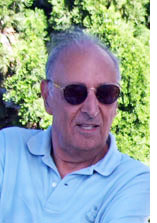 LA JOLLA, California— Many years ago, there lived in Tunisia, then still governed by the Ottoman Turks, a rabbi and scholar, Moshe Sfez his name, who was poor, pious, and devoted to the study of Torah and Talmud with his numerous disciples. He also wrote, and wrote, and filled manuscripts with his commentaries on the Holy Scriptures.
LA JOLLA, California— Many years ago, there lived in Tunisia, then still governed by the Ottoman Turks, a rabbi and scholar, Moshe Sfez his name, who was poor, pious, and devoted to the study of Torah and Talmud with his numerous disciples. He also wrote, and wrote, and filled manuscripts with his commentaries on the Holy Scriptures.
When his wife died, the Community provided him with some hired help: a Jewish widow who cooked and cleaned for him and a young Arab servant for the other chores. Sadeq was his name but the Rabbi called him Tzaddik, the righteous one.
And righteous he was, indeed. Sadeq venerated Rabbi Moshe as a saint and was awestruck by his radiance. He also enjoyed the loud and animated talmudic discussions, and even became familiar with the most common Hebrew terms like Torah, Talmud, Mishna, and with the blessings on food, hand-washing, and other prayers.
Years went by. One day, Sadeq heard the town crier announce that the captain of a Turkish ship anchored at the harbor was recruiting young men to work as sailors. They would receive a free passage to Istanbul and also somemoney. For him, the offer was very tempting. He would send half the money to his widowed mother, he thought. But what with Rabbi Moshe? He couldn't abandon him! He soon decided that unless he obtained the Rabbi's permission, he would not leave him.
When the Rabbi heard about his plans, he told him: " Tzaddik, my son, your duty to yourself, and even more to your mother, takes precedence over me. Don't worry about me; God will provide." He then signaled him to approach, put his two hands over Sadeq's head and intoned the Birkat Hakohanim, the traditional Hebrew blessing: "May God bless you and protect you! May God lighten his face to you! May God bring peace to you!" Then he added: "May God give you health and wealth and fill your hands with gold and precious stones!"
When Sadeq saw Istanbul, he was captivated by its beauty and decided to stay. After a few odd jobs he was hired by a baker to sell bread at the store. He was diligent at his work, honest, kind and courteous. The customers loved him. One of them, a frail old man for whom he had delivered his daily bread home for years, invited him one day to come inside his house, and showed him a room full of gold, and jewels, and precious stones. "Sadeq my son," he said, " I am alone in the world, I have no heirs; you have been so good to me, you are so kind and righteous; I have decided to leave all this to you; I have already signed the papers with the QADI, the religious authority." Sadeq was stunned.
He couldn't believe what he saw and what he heard. But then he remembered: could this be the fulfillment of the Rabbi's baraka, the benediction, he wondered?
When the old man died, Sadeq became one of the richest men in Turkey. Through his good deeds, he became very famous, and the Sultan appointed him as vizir, cabinet minister.
Many years passed. Rabbi Moshe Sfez, feeling weaker every day, decided to go on pilgrimage to the Holy Land, to see the remains of the Temple in Jerusalem, to die and be buried in the Holy City. Palestine was also under Turkish rule, and the Rabbi's ship was scheduled to make a stop in Istanbul. Alerted to his visit, the Jewish community of Istanbul publicized the imminent arrival of this famous rabbi and scholar of world renown, Rabbi Moshe Sfez from Tunisia.
When Sadeq, now Minister of his Imperial Majesty, heard about the event, he summoned the leaders of the Jewish community and ordered them to have a full month of celebrations and festivities, with pageants and honors as befits an eminent guest of the Crown. He would take care of all expenses.
All was done as commanded. When the time came for the Rabbi to continue his voyage to the Holy Land, he thanked his hosts in the Jewish community for the magnificent reception which, he added, he did not deserve. But the Chief Rabbi of Turkey told him that they did not deserve the thanks either, which should go to the vizir Sadeq who would be there shortly.
When Sadeq arrived, he ran to the Rabbi, took his two hands and kissed them with veneration and submission. The Jewish delegation was very embarrassed and confused. They lunged toward the door but the Minister stopped them.
"Stay here," he ordered, and proceeded to tell them the whole story, peppered with Hebrew words and phrases, to the stupefaction of his bewildered audience."These hands I kissed," he concluded, "are the hands that gave me the blessings which made me what I am today." Then he wished a safe trip to the Rabbi and ordered his personal guards to accompany him to the Holy Land and see that his every wish isfulfilled. He also gave them a letter of credit to the Ottoman bank in Jaffa, with the order to buy for the Rabbi a big house where he would establish a yeshiva that would be named Yeshivat Hatzaddik. The Jewish community in Turkey never saw better days.
Columnist Yetiv can be contacted via yetivi@sandiegojewishworld.com
Return to top
![]()
LAWRENCE FAMILY JCC, JACOBS FAMILY CAMPUS


Please click on the above ad to learn about the many programs of the San Diego Community
College District
Return to top
![]()
AMAZING STORIES OF JUDAISM DVAR TORAH: Yisro
He could attend shul just one day a year, but which day?
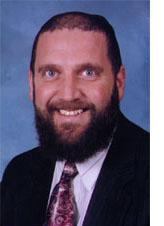 SAN DIEGO—Hashem offered the Torah to all the nations of the world. They asked to look it over first and each nation in turn found something they didn't want in the Torah and rejected it. Hashem then offers the Torah to the Children of Israel. We accepted it on the spot, sight unseen, without hesitation or equivocation.
SAN DIEGO—Hashem offered the Torah to all the nations of the world. They asked to look it over first and each nation in turn found something they didn't want in the Torah and rejected it. Hashem then offers the Torah to the Children of Israel. We accepted it on the spot, sight unseen, without hesitation or equivocation.
The following true story was told by Rabbi Avrum Bogopulsky at the Bar Mitzvah of Daniel Peikes:
Five Hundred years ago, a Jewish man was arrested on trumped up charges. Given the corrupt system which was even more corrupt when Jewish defendants were concerned, he was convicted and sentenced to prison. The warden of the prison was a notoriously cruel man with a demented sense of humor.
While he was there, the warden gave him a special offer. "I will let you leave the prison for one day to go to your Jewish temple and pray with the congregation. You pick the day."
He couldn't imagine why the warden was doing this, but it was an amazing offer. Torah and Mitzvah observance was a veritable impossibility in that prison. This was his big chance to spend a day in prayer with a minyan, a day to engage in Torah and Mitvos with his fellow Jews.
The man pondered. If he only had one day to attend shul, what day should that be?
His first thought was Yom Kippur. The Day of Atonement. The holiest day of the year.
Then he thought that the most appropriate day would be Tisha B'av. This is a day in which we come together as a nation and mourn the destruction of the Jerusalem Temple. It is a day of solidarity for the Jewish people.
The he thought the holiday of Pesach was the most appropriate. We celebrate liberation from Egyptian slavery, perhaps observing this day would be a merit for liberation from prison.
Succos might be the right day to choose. The Sukkah represents Hashem's protection of the Jewish people.
Perhaps Rosh Hashana when he could hear the shofar, repent, and coronate Hashem as the King of the Universe. Perhaps Shavuous when he could relive the giving of the Torah at Mount Sinai.
The more he thought about it, the harder it was to make a selection. There were so many excellent choices. He desparately wanted to make the best decision and do the right thing; but what was that?
Just then, the famous Radbaz, (Rav David ben Zimra) entered. He was visiting the prison to aid the Jewish inmates. The man asked the Radbaz the question. "Rebbi, which day should I choose?" he inquired, anxiously awaiting the Rebbi's response.
The Radbaz looked at him with piercing eyes. "There is really no question. The day you should choose is today. Ain maavirin al hamitvos - we do not pass up the opportunity to do a mitzvah. If you have the chance to do a mitzvah do it immediately. If the warden is letting you go to shul, do it right away. Do not delay."
Besides the practical reason that if you choose a special Jewish holiday, by the time that day comes around, the warden may change his mind; the fact remains that a mitzvah is a precious gift from Hashem. Every mitzvah enhances our lives and embodies Hashem's love for us and our love for him. By doing a mitzvah with alacrity we show our love, loyalty and passion for Hashem, His holy Torah and precious mitzvos.
Dedicated by Dr. Martin C. Fineman in memory of his father William W. Fineman.
Rabbi Lederman is spiritual leader of Congregation Kehillas Torah in San Diego. He may be contacted at rbl613@nethere.com
![]()

To hear the world's most beautiful music, please click on the advertisement above
Return to top
![]()
BALLOON UTOPIA

Return to top
![]()
A bissel sports trivia with Bruce Lowitt
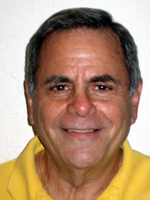 OLDSMAR, Florida—Q: Who was a bat boy for the Philadelphia Phillies, played for them, and is now their senior vice president and general manager?
OLDSMAR, Florida—Q: Who was a bat boy for the Philadelphia Phillies, played for them, and is now their senior vice president and general manager?
(a) Jose De Leon
(b) Ruben Amaro Jr.
(c) Omar Olivares
(d) Alejandro Sanchez
Background: This switch-hitting outfielder played at Stanford and helped lead them to the 1987 NCAA championship, was drafted by the Angels, was traded to the Phillies, then to the Cleveland Indians, then back to the Phillies. He retired after the 1998 season and was named to his current post last November.
Please click here for answer
Return to top
![]()
AMERICA'S VACATION CENTER
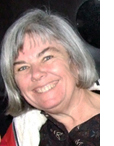
(619) 265-0808
nancy.harrison@americasvacationcenter.com
Friends: The slogan of San Diego Jewish World is "there's a Jewish story
everywhere." I can help you travel to the locales of such stories. I'll work
hard to find you the very best prices!
Return to top
![]()
Jewish Internet Favorites
To see previous selections, please click here to go to our archive index
Josef Kobzon sings "Song of Sofia Rotaru" with children's choir (Russian):
Reinette L'Oranaise —A portrait and performance by the blind Algerian Jewish singer (Arabic and French)
Shlomo Artzi sings "We Don't Need More Than That" (Hebrew, English subtitles):
Return to top
![]()
CAROL ANN GOLDSTEIN
Carol Ann Goldstein provides the following services: Web Developer-information and ecommerce sites Database programmer Math Tutor -- all ages (San Diego, CA.) Call 858 452 0386 or email cag_92122@yahoo.com |
Adventures in San Diego Jewish History
Editor's Note: Read in this continuing column how the generations who came before us helped to build San Diego's Jewish community! You may access an index of San Diego Jewish history articles by clicking here. You may also use the Google search program at the top of this page or on the headline index page to search for keywords or names.
Community Currents
Southwestern Jewish Press, September 5, 1952
By Albert Hutler
Director, United Jewish Fund
Day Camp—Returned questioneers (sic, questionnaires) on the Day Camp operated by the Jewish Community Center indicated that it was the most successful camp in the six years of operation. Over 95 percent reported that their children would return to the camp next summer. Everything points to an even larger enrollment next year. Did you read the article in the August 15th issue of Point Magazine about Camp Jaycee? It certainly showed the community relations job that a center activity can accomplish. When I look at the Day Camp I sort of feel like a father who has watched his baby grow up to maturity. Here certainly is a “community service being rendered by a Jewish agency.”
The 23 Camp Jaycee campers who spent a week away from home at Camp Whispering Pines in Julian, California had a remarkably fine experience. The cottage facilities were excellent; the pool was tops and activities were varied. Swimming every day, horseback riding, marksmanship, archery, crafts, volleyball and softball, hikes, campfires will long be remembered by the youngsters who attended. Campers were Debby Strauss, Robert Brandenburg, Donna Damico, Martin freedman, Jeffrey Bennett, Michael Bennett, Diane Schweitzer, Philip Sosna, April Soule, Michael Salisbury, Frankee Dee Hutler, Sue Hutler, Andrea Beck, Deby Schulman, Andy Leeds, Bryon Lindsley, Ruth Freedman, Michael Stolarsky, Leslie Moon, Jimmie Elden, David Elden, Linda Hess, Jerry Varon.
Organizations—September sees the reopening of organizational activities. I looked through our calendar book and one can notice the large amount of activity in our town. There have been a few conflicts over dates between organizations but in the main its pretty well coordinated. There will be a meeting of the President’s Council on September 25th to clarify some conflicts that have occurred.
Hebrew Home—Recently the Home with the assistance of the Jewish Social Service Agency has formed a panel of dotors to service the Home. All Jewish doctors are participating. This will relieve Dr. Fred Hollander who has been the mainstay of medical services for the residents.
Community Center—With the coming of Sid Posin as Director of activities for the center a fine group work program will be started. Sid is an extremely competent, mature person and you’ll enjoy working with him. If you are interested in a center in San Diego, he’d like to meet you. He’ll be officing at the Federation office, 333 Plaza, M-5172 until a facility is found for him.
In Memory {Otto Aufricht}
Southwestern Jewish Press, September 5, 1952
A monument in memory of Otto Aufricht will be unveiled on Sunday, September 14, at 2:00 p.m. in the Home of Peace Cemetery.
Rabbi Addleson Weds Miss Peters
Southwestern Jewish Press, September 5, 1952, page 3
Announcement is being made of the marriage of Rabbi N.I. Addleson to Miss Clara Peters which was solemnized on Sunday, August 24, at the Mogen David Congregation, Los Angeles, with Rabbis A. I. Maron and H. Singer officiating. The entire family of Rabbi Addleson who reside in San Diego comprising his sisters and brothers-in-law and also the bride’s family were present at the ceremony. Mr. I. Jacobson, a past president of Tifereth Israel in San Diego, acted as master of ceremonies. Rabbi and Mrs. Monroe Levens presented the bride with a deluxe morocco white bridal Bible which she carried at the ceremony.
Miss Peters came to Los Angeles in 1949 from Manchester, England, her native country, and is a graduate from the Manchester University.
This is the bride’s first marriage and the second for Rabbi Addleson. Following their two weeks vacation, Rabbi and Mrs. Addleson will make their home in Los Angeles in the Pico and Crescent Heights district. Rabbi Addleson has already accepted a call to officiate for the ensuing High Holiday services at Beth Israel Synagogue in Los Angeles. A trip to England and to Israel is being planned by Rabbi and Mrs. Addleson in the early part of next spring.
Hadassah Presents The Lox and Bagel Strollers Sept. 10
Southwestern Jewish Press, September 5, 1952, page 3
Hadassah women will be put fashion wise at their opening meeting on Wednesday, September 10 at Temple Center, when they will preview fall fashions by Kippy’s of Coronado. Not an ordinary fashion show, this one will be in the form of a skit entitled “Pretty Baby” written and directed by Mrs. Morton Thaler, according to program chairmen, Mrs. David Block and Mrs. Gabriel Berg.
Featured on the program will be “The Lox and Bagel Strollers,” a trio consisting of Mmes. Leo Beck, Leon Heiman and Ray Lieberman. Mink-coated Miss Nancy Bloom, daughter of Hadassah member, Mrs. Sol Bloom, will do a take-off on one of the numbers from the popular Broadway show “Guys and Dolls.” Also in the cast will be Mmes. Harry Farb, Arthur Goodman, Ben Harris, Joseph Kwint, William Lipin, Seymour Rabin, Harris Rubel, Nathan Schiller, Abe Sklar, Al Slayen, Herbert Solomon, Jack Stern and Misses Arlene and Nancy Solof. Mrs. Victoria Selten will be commentator for the show, and Mrs. Esther Herz will provide the music in accompaniment.
Prior to the afternoon’s entertainment, Mrs. Albert Krasnow will present “Hold High the Torch,” an induction of new members. Following last year’s tradition, luncheon will be served, prepared by Luncheon Chairman Mrs. Edward Addleson, and her Co-Chairmen, Mrs. Albert Doctor and MRs. Leon Solomon. Since a very large turnout is expected, it is urged that luncheon reservations be made with Mrs. Ben Harris, T-1-3328, or Mrs. Ray Bass, T-1-4919.
City of Hope Aux.
Southwestern Jewish Press, September 5, 1952
Vivacious Frances Strauss, well known as a leader in Jewish Circles here in San Diego, will be at the next meeting of the City of Hope Jr. Auxiliary, September 9, at the Landis Street Center at 8:00 p.m. to tell the girls about the wonderful work of the City of Hope at Duarte.
A short business meeting will precede the talk. Refreshments will be served. Members are invited to bring their friends.
“Adventures in Jewish History” is sponsored by Inland Industries Group LP in memory of long-time San Diego Jewish community leader Marie (Mrs. Gabriel) Berg. Our indexed "Adventures in San Diego Jewish History" series will be a daily feature until we run out of history.
![]()
SPORTS TRIVIA ANSWER: (b) Ruben Amaro Jr.
Return to top
![]()
Links to previous editions
Copyright 2007-2009 - San Diego Jewish World, San Diego, California. All rights reserved.
< BACK TO TOP